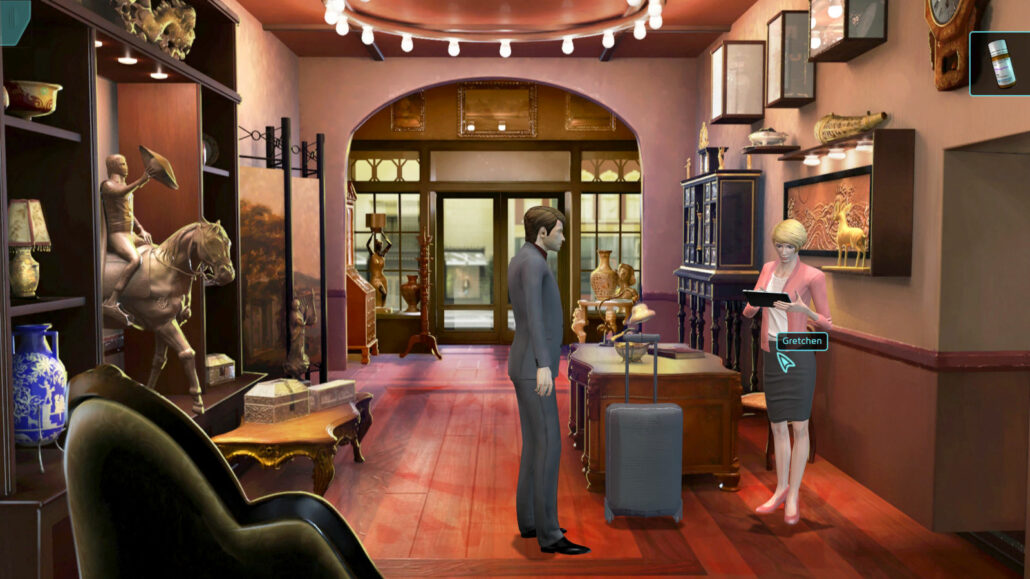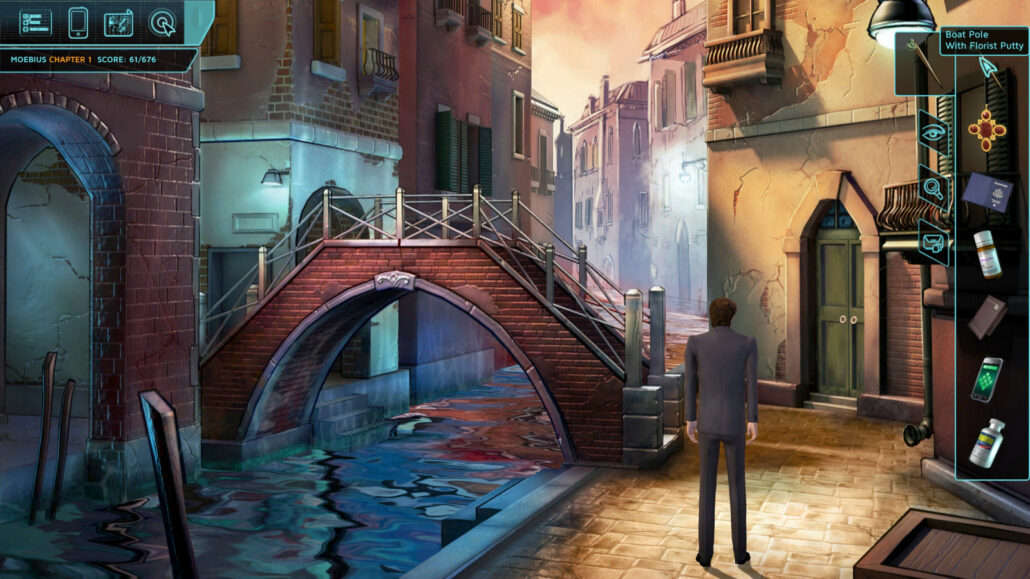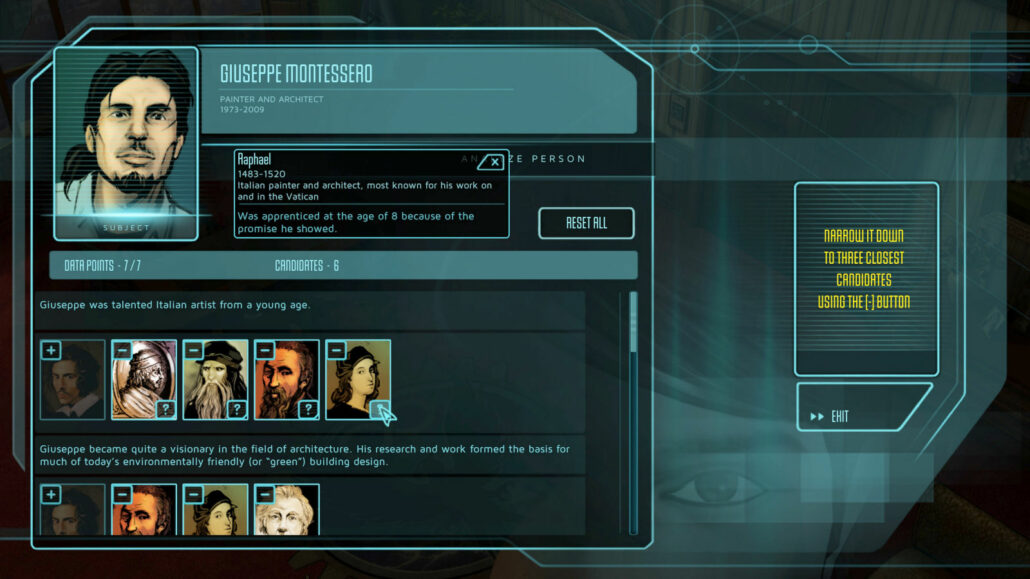Developer: Pinkerton Road Studio | Released: 2014 | Genre: Adventure, Point & Click
I’ve completed the three Gabriel Knight games many years ago and gained a solid respect for Jane Jensen’s writing. That’s also why I backed the Kickstarter campaign for it in 2013. However, since its release it has received a mixed bag of reviews and it always had me avoid it in the Steam backlog.
Until now. And I confess that once again, it was originally my intention to play it for an hour or so and then dump it into my series about Short Sessions. The 3D models was not exactly doing it any favors.

But in spite of the mediocre walking animation, lip sync and those crazy eyeballs of persons trying to look behind their own ears, the story and the analyzing puzzles quickly grabbed me.
The protagonist, Malachi Rector, was a Sherlock Holmes kind of guy with a very high IQ. As an expert in antiquities with a photographic memory, he was sometimes hired to evaluate new antique findings, which he then ruthlessly declared to be trash. In spite of his elegant demeanor, he was sometimes belittling requests and sarcastically denounced objects around him. And he was regularly taking pills.
I immediately liked him.
Also, Jane Jansen’s husband Robert Holmes was back. I loved his music for their older adventure games. Especially the title theme tune for Gabriel Knight 3 was marvelous. And sure enough, he didn’t disappoint here either. The title theme tune had a really nice melody, and the later chords were true bliss. I’m a sucker for these kinds of compositions. The in-game background tunes were nice too.

The point-and-click user interface was okay. Although a tad oldskool, with a cluster of additional icons popping up when clicking labels, thankfully it was still all done with left mouse button clicks. No right mouse button here like in SpaceVenture. Walking had a teleport when using double-click, and dialog sentences could usually be skipped, although this didn’t always work.
Malachi could also analyze persons after collecting data points about them. This opened a screen with a lot of profiles from old history, and I then had to exclude the ones that didn’t match well enough. In the end three profiles were shown side by side, and I had to choose the final one.
There was also a different kind of analyzing puzzle when meeting people for the first time in person. I could click key points on a paper doll and select one guess out of three for each of them.

There were a total of seven chapters and Malachi was traveling to major cities around the globe to talk to people and solve puzzles. It’s true, Malachi sometimes behaved in an arrogant or even condescending manner, but I think it fit the personality well in the way I believe Jane Jensen intended him to be. Come on people, he’s not exactly breaking new ground here. Think about Guybrush Threepwood, or especially Rufus from the Deponia series. Rufus could be downright despicable at times too.
I liked Rufus way less than I liked Malachi.
In the final chapter, I had to navigate through a maze. Some reviewers made this sound like the worst experience where you have to draw it on several sheets of paper in order to even begin understanding it, but when I finally hit it and got through it, I was wondering what all the fuss was about. I’d call that maze a really light one. I didn’t even use the constellation hints on the walls.
The tooltip for the library computer could clearly be read on the 4K screen resolution I ran the game in. I still had to go through the trouble of letting David flirt with the librarian so that Malachi could read it.
The cipher puzzle in Reichart’s office was surprisingly tricky. It actually threw me for a loop and I had to talk to people to learn more cipher words for it. I actually thought it was bugged at first. Sorry.
I agree with one reviewer that going back to Malachi’s home street for getting a drink was a bit much. I wonder how long it would have taken me to come up with it had I not read about it in a review.
Oh, so you’re introducing deaths where I have to retry a sequence as late as in chapter 6? That was a weird timing. It reminded me of that game where QTE was also introduced conspicuously late.
Malachi eating a SIM card – certainly worth a smile.
I liked that I had to use the countdown timer of the flashbang to time both it and a grenade blowing up at the exact same time, to prevent a soldier from learning that Malachi was blowing a grate open.
Why didn’t the hotspot button work in the maze? Not that I needed it – just wondering.
And yes, I did feel ever so subtle gay tones between Malachi and David. Thankfully, it didn’t go there.
Pros
- Nice 2D backgrounds with lots of detail for the 3D models to work on.
- Excellent title tune and background music by Robert Holmes.
- Many surprisingly detailed animations of Malachi taking things or using something.
- The user interface is okay – sort of a blend between oldskool and modern UI.
- Clicking an exit immediately changes the scene. You rarely need to see Malachi walking first.
- Interesting analyzation puzzles that makes good use of Malachi’s photographic memory.
- There’s a button for showing all hotspots on the screen, but they’re rarely hard to find.
- The maze is not that bad. Really. I’m the worst casual gamer ever and I found it easy.
Cons
- Slightly sticklike 3D models with abnormally wandering eyes.
- Death-and-retry sequences are introduced surprisingly late in the game.
- The analyzation puzzles with historic portraits completely resets if your guess is wrong.
- Some locations barely have one or two rooms to explore. Not exactly overwhelming.
- Interrupting dialog sometimes freeze the interactivity for a few seconds afterwards.
- A few objects can’t be picked up until Malachi decides he needs it for a puzzle.
This game has received a lot of mediocre reviews. I won’t say it’s a masterpiece and it certainly seemed a bit rough around the edges, but I still believe it deserved better. Even though the sticklike 3D models and their animations looked basic, the characters and the story had enough meat to keep me entertained. I have a sneaky feeling some reviewers detracted from the score because of that maze sequence in the end.
You call that bad? You should see the terrible mazes I have witnessed in my gaming lifetime.




